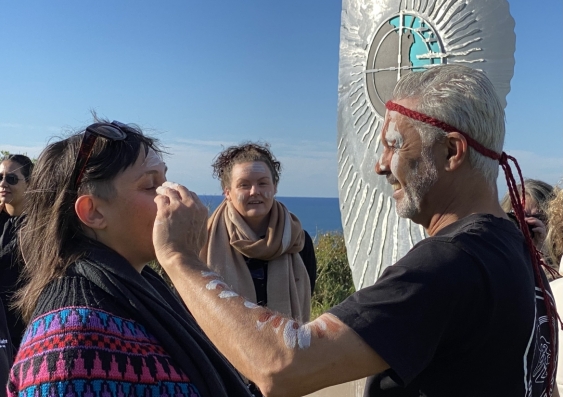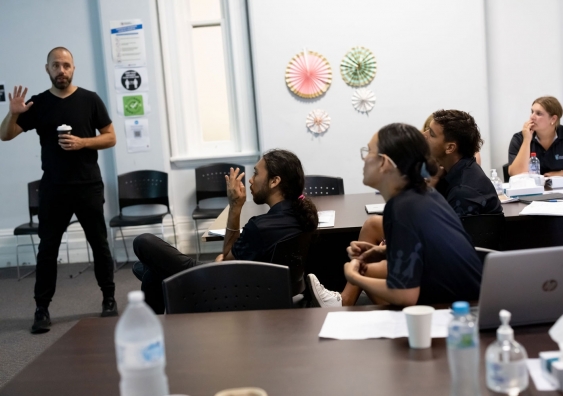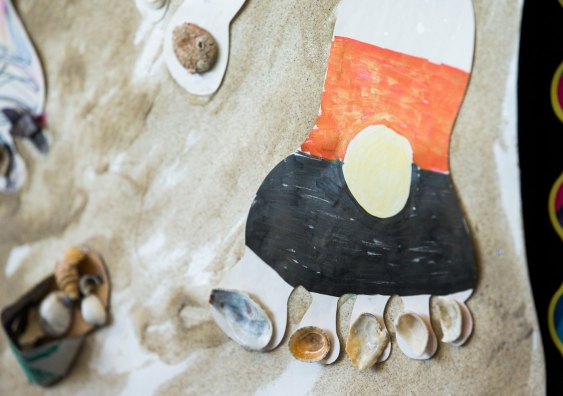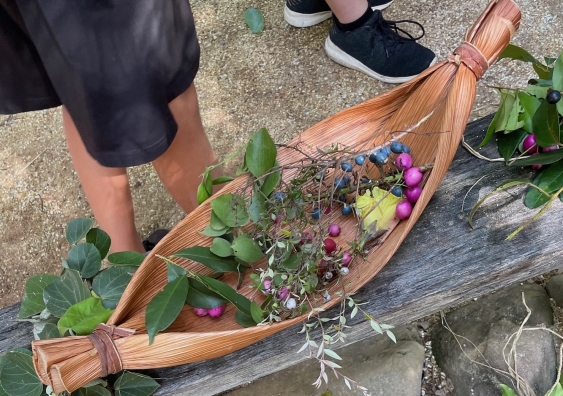Research finds taking teachers onto Country can improve schooling for Aboriginal and Torres Strait Islander students.
Taking teachers out of the classroom and onto Country is building connections and confidence to imbed cultural knowledges and community understandings in classrooms across the state, says research led by UNSW Sydney.
The (CNS) engages teachers, school leaders, local Aboriginal Cultural Mentors and community members through strategies designed to develop teacher confidence and improve educational engagement of Aboriginal students.
“This holistic, community-wide approach to education is enabling our CNS schools to boost local connections, build trust between teachers and students, and increase cultural understanding,” says Lead Investigator on the CNS project, Associate Professor Kevin Lowe, Scientia Indigenous Fellow at the School of Education, UNSW Arts, Design & Architecture.
Four years into the project, teachers are reporting increased confidence to engage more fully and authentically with their Indigenous students, to embed Aboriginal perspectives in their teaching, and to build relationships with families and community members.
“These changes are transforming students’ learning experiences, with teachers reporting increased class attendance rates, noticeably improved student engagement and eagerness to learn, a renewed sense of cultural pride and a heightened sense of belonging,” says A/Prof. Lowe.
Media enquiries
For enquiries about this story and interview requests, please contact Culturally Nourishing Schooling.Ěý
·ˇłľ˛ąľ±±ô:Ěýcns@unsw.edu.au
Building connection and confidence
Learning from Country, along with the other educationally aligned , encourages teachers to think, act and relate differently in relation to Aboriginal students and the places and histories they are grounded in.
A published in the Australian Educational Researcher shares insights from the CNS project. It documents the impact of learning from Country on teachers' understandings of place and community.
“Learning from Country is about deepening understanding of Country and the local contexts of each community’s schooling experiences, its histories and lived experiences, important socio-historical events and cultural knowledge,” says Dr David Coombs, lead author of the study from the School of Education. “It creates a sense of belonging and inclusivity and positions Aboriginal people as knowledge holders.”
According to , teachers can be hesitant to or avoid teaching Aboriginal content for several reasons, including their own lack of education. Learning from Country attempts to resolve this by connecting teachers to their local area through Aboriginal relationships to Country and to local families and communities.
“It's vital to have a strong relationship within your school and your community so that students feel valued,” says Tracey Kingi, a Cultural Mentor from Tweed River High School. “When we get people coming in from the community, the kids see that and they get a real sense that it's part of their identity.
“They see someone in the school that they know – the Aunties, the Uncles – and that sort of builds their confidence to be able to engage with their education.”
It creates a sense of belonging and inclusivity and positions Aboriginal people as knowledge holders.
The CNS team is working with eight schools in urban, rural and remote settings across NSW. Each year a cohort of teachers participates in professional learning strategies, starting with two-day Learning from Country activities led by local Elders and CNS Cultural Mentors.
CNS teachers reported an increased understanding of and connection to community and the fundamental importance of Country in learning and teaching.
“Teachers described greater appreciation of the diversity within Aboriginal communities and cultures and developed a more nuanced and localised understanding of place, community and knowledge,” says Dr Coombs.
“The Culturally Nourishing Schooling project has been invaluable for building a connection with the local community, which I think has been helpful not just as an early career teacher, but for all teachers – especially teaching within a new community,” says Julia Dimitriadis, a teacher at Matraville Sports High School. “You really do need to build those local connections and Culturally Nourishing Schooling has been fantastic for helping me do that.”
The initial trial of the CNS model will conclude at the end of 2024. If the program can secure additional funding, it is anticipated that the trial will be extended to involve new schools from across New South Wales, as well as researchers and schools from Victoria and South Australia.
Related stories
-

Giving Aboriginal students and communities a voice in schools
-

Reclaiming language is key to Aboriginal cultural identity and wellbeing
-

Closing the other gap: instilling Indigenous knowledge in young hearts and minds
-

$3m gift to improve education outcomes for Aboriginal and Torres Strait Islander students




